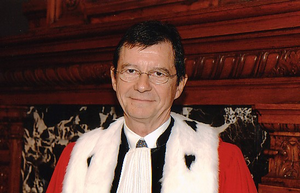Criminal justice in Cambodia

Following several seminar sessions in the framework of continuing training for professionals, in particular to the address of Lawyers and Trainee Lawyers in December 2014 in partnership with the Paris Bar, on “Criminal Law and Ethics of Lawyers”, and then addressed to parliamentarians on “the Causes and Difficulties of Application of the Criminal Code and the Code of Criminal Procedure” held the 6th and 7th of April 2015 at the Senate with the particular intervention of the french Magistrate Mr. François-Louis Coste, the Association Henri Capitant Cambodia (HCC) continues its action, year after year, for a better performance of the Criminal Law in Cambodia.
This time, “The rights of Defense” and “Ethics and Judges” were the themes presented by the International Judge Mr. Marcel Lemonde on the 29th and 30thof November 2016, under the aegis of the Association Henri Capitant Cambodia (HCC) in the framework of its draft clarification of the Cambodian Criminal Code and the Code of Criminal Procedures. This formation was intended for legal practitioners (Judges and Trainee Magistrates), with the perspective of ensuring an effective and equitable Criminal Justice System for all The litigants.
Why these Trainings?
Indeed, Criminal Justice, which defines harmful behaviors to the society and which provides society’s reaction against these behaviors, must be a guarantee of security and peace for any society.
It is therefore, concerned about this imperious necessity of social tranquility, that AHCC initiated these training sessions around these two fundamental themes of the penal process (The rights of Defense and Ethics and Judges) for all those responsible for enforcing the criminal justice system with a view to the guarantee of the fundamental rights and freedoms of the accused person.
And as Mr. Marcel Lemonde pointed out: “The job of a Judge is not a natural profession, it is not normal to judge his fellow men“. It goes without saying that magistrates are being trained to improve their knowledges and, by the same way, ensure a fair trial.
This is the purpose of these training courses, to fill the gaps in our texts and improve the performance of our legal practitioners in order to propose means to improve proper application of these texts and thus better protect the citizen’s rights.
What is the situation in Cambodia?
During these courses, in addition to the theme “Ethics and Judges” (the set of rules of good moral conduct that a good judge must respect in independence and impartiality), Mr. Marcel Lemonde insisted on the importance of “the Rights of Defense” which must guide the criminal trial because “without true defense there is no true Justice” and remains convinced that “the future of the country depends to a large extent on its Justice“.
Although most of the codes, and in particular the Cambodian Code of Criminal Procedure (which is inspired by the French Code of Criminal Procedure), do not provide any fundamental principles, it is important to note that Cambodia has ratified in 1962 the International Covenant on Civil and Political Rights of the United Nations in which the grand principles of the Rights of Defense are listed.
In addition, the Article 31 of the Cambodian Constitution states that: “The Kingdom of Cambodia recognizes and respects human rights as enshrined in the United Nations Charter, the Universal Declaration of Human rights and all the treaties and conventions related to human rights, women’s rights and children’s right“.
Similarly, the Rules of Procedure of the Extraordinary Chambers of the Courts of Cambodia (ECCC), an ad hoc tribunal to prosecute the senior leaders of the Khmer Rouges regime contains these basic principles in its Rule 21.
Thus, the experience of the ECCC, Institution where Mr. Marcel Lemonde was the first International Investigating Judge and Chairman of the Committee in charge to draft the ECCC’s Rules of procedure, coupled with these training sessions, provided an opportunity for all participants to analyze the efficiency of Cambodia’s new Criminal Code and Code of Criminal Procedure.
The discussions thus served to enrich and explain the interests of Criminal Justice reform in Cambodia.
What are the prospects?
HCC therefore intends to inform all Cambodian actors of the criminal trial in order to restore a confidence between Judges and litigants and to eradicate the risk that the litigants will do justice to themselves.
Accordingly, all these opinions will be incorporated into HCC’s plans for the clarification and annotation of the Cambodian Criminal and Code of Criminal Procedure, which will make them more accessible and useful.
Please, find the reports of these trainings here: By Issouf NIANG, Henri Capitant Cambodia
